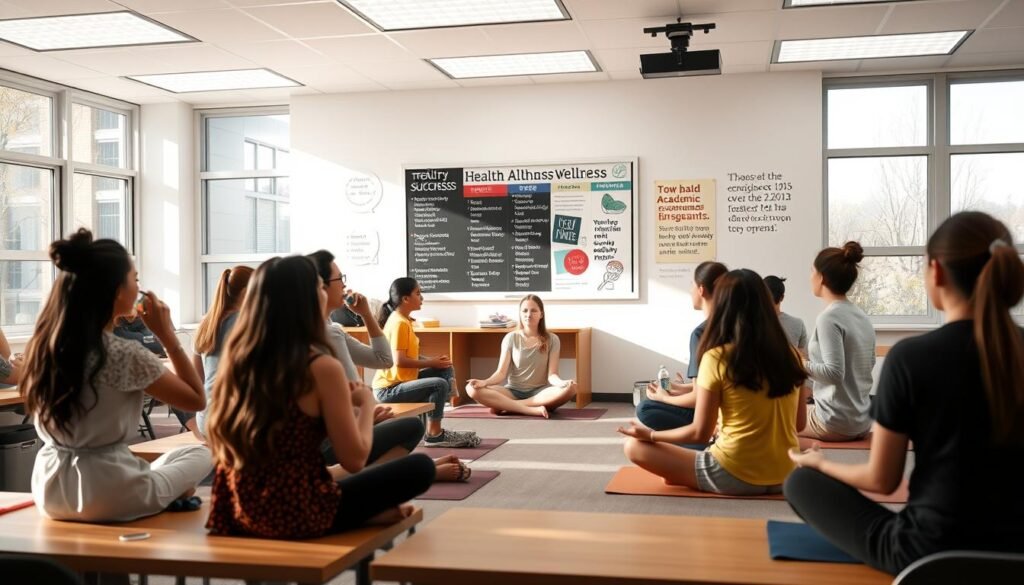Ever wondered how working professionals juggle jobs, families, and Ivy League coursework—and still excel? Balancing education with life’s demands isn’t easy, but it’s far from impossible. Many adult learners thrive by applying smart, flexible approaches tailored to their busy schedules.
At Penn LPS Online, we understand the unique challenges faced by students managing multiple responsibilities. Our mission is to make top-tier education accessible, whether you’re pursuing a certificate or a degree. The right strategies can transform your learning experience, linking classroom gains to career growth.
This guide shares 10 actionable tips to help you stay organized, motivated, and ahead of the curve. Let’s turn your goals into achievements—without burnout.
Key Takeaways
- Balancing work, family, and education requires practical time management.
- Ivy League programs like Penn LPS Online offer flexible learning options.
- Tailored approaches improve both personal and professional growth.
- Small, consistent efforts often outperform last-minute cramming.
- Support systems and resources are critical for long-term success.
1. Set Clear Goals Using the SMART Framework
Without a roadmap, even the most dedicated students can lose direction. The SMART framework turns vague aspirations into actionable steps. By defining Specific, Measurable, Attainable, Relevant, and Timely objectives, you create a path to consistent progress.
Specific: Define Your Academic Objectives
Instead of “study more,” aim for “complete one chapter daily.” Penn LPS Online students often use apps like Trello to break courses into smaller tasks. Clarity reduces overwhelm.
Measurable: Track Progress with Tools
Digital tools like Toggl or Google Sheets help quantify effort. For example, logging 1-hour reading sessions ensures accountability. Data reveals patterns—adjust as needed.
Attainable: Balance Goals with Real-Life Demands
A parent working full-time might set 30-minute study blocks. Share schedules with family using templates to protect dedicated time. Realistic plans prevent burnout.
Relevant: Align Goals with Long-Term Aspirations
Connect coursework to career growth. A Penn LPS alumni used their certificate in Leadership to secure a promotion. Every assignment should serve a bigger purpose.
Timely: Set Deadlines for Accountability
Accelerated 8-week courses thrive on weekly milestones. Mark calendars with checkpoints (“Finish Module 2 by Friday”). Deadlines turn intentions into results.
2. Master Time Management for Balanced Success
Time is your most valuable asset—learn to control it before it controls you. Penn LPS Online courses demand 10–15 weekly hours of study, but with the right management, even busy professionals excel. A military student once compared coursework to mission planning: “Every minute counts.”
Prioritize Tasks with Planners or Apps
Digital tools like Todoist and Outlook Calendar help categorize assignments. Todoist excels for quick task logging, while Outlook integrates with email for seamless scheduling. Penn LPS learners often color-code tasks by urgency—red for deadlines, green for readings.
Allocate Dedicated Study Hours
Early risers swear by 5 AM study blocks before family duties. A time-blocking matrix splits your day into 90-minute focus sessions. For example: 6–7:30 AM (reading), lunch breaks (quizzes), 8–9:30 PM (essays). Consistency beats cramming.
Schedule Breaks to Avoid Burnout
The Pomodoro technique adapts well for online learners: 25 minutes of study, 5-minute breaks. After four cycles, take a 15-minute walk. Watch for burnout signs—fatigue, irritability, or slipping grades. Hydrate, stretch, and step away when needed.
3. Leverage Course Materials Effectively
Your course materials are more than just readings—they’re tools for mastery. Penn LPS Online’s 8-week format requires sharp focus, but the right approach turns overwhelming content into manageable wins.
Utilize Syllabi as Roadmaps
Start by dissecting the syllabus. Highlight grade weights (e.g., “Discussions: 20%”) to prioritize tasks. One student aced assignments by color-coding deadlines—red for exams, blue for essays.
Engage with Online Learning Platforms
Canvas, Penn LPS’s platform, centralizes video lectures, Zoom links, and readings. Use its mobile app for quick access during commutes. Pro tip: Bookmark the “Modules” tab to avoid digging for information.
Attend All Classes to Stay on Track
Penn LPS data shows 92% completion rates for students who never miss live sessions. Sync class times with phone alerts. Missed one? Watch the recording at 1.5x speed to catch up fast.
Pair these tactics with apps like Notion or Evernote for annotated readings. Highlight key terms, add margin notes, and summarize paragraphs in your own words. Active engagement beats passive scrolling.
4. Build Relationships with Instructors and Peers
Strong connections with instructors and classmates can make or break your learning journey. At Penn LPS Online, 78% of students report higher grades when actively engaging with faculty and peers. These relationships provide clarity, motivation, and career opportunities.
Participate Actively in Discussions
Online discussions thrive with the Claim-Evidence-Analysis (C-E-A) method. Start with a clear claim, back it with course materials, then analyze its impact. Mary Koenke, a Penn LPS grad, credits C-E-A for her promotion—her posts showcased critical thinking.
Penn LPS requires two discussion posts weekly. Aim for one early reply and one thoughtful response to peers. Use real-world experiences to enrich conversations.
Form Study Groups for Collaborative Learning
Virtual study groups on Discord or WhatsApp keep accountability high. Split tasks: one member summarizes lectures, another creates quiz questions. Penn LPS alumni surveys show 60% of study group members land job referrals.
Seek Feedback Through Office Hours
Faculty at Penn LPS respond to emails within 24 hours. Bring specific questions to office hours—like “How can I improve my thesis statement?” Preparedness shows initiative and maximizes your time.
5. Access Campus Resources for Support
Behind every thriving student is a network of support systems waiting to be tapped. Penn LPS Online offers tools like tutoring, advising, and tech help—all designed to keep you on track. Whether you’re troubleshooting an assignment or planning your degree, these resources save time and stress.
Consult Academic Advisors
Advisors help map your academic journey. Before meetings, prepare a degree audit and list questions. Penn LPS advisors specialize in flexible paths for working adults—ask about credit transfers or accelerated timelines.
Use Tutoring Services Like Brainfuse
Brainfuse offers live tutoring and essay reviews with a 12-hour turnaround. Submit drafts with specific questions (“Is my thesis clear?”) for targeted feedback. 85% of users report higher grades after three sessions.
Explore Technical Support Options
Canvas glitches? Email Penn LPS’s 24/7 tech support with screenshots. Common fixes include clearing cache or switching browsers. For off-campus library access, use the VPN guide linked in your student portal.
Disability services provide accommodations like extended test time. Submit requests early—approval takes 5–7 business days. Remember, these resources exist to level the playing field.
6. Prioritize Physical and Mental Health
Your well-being fuels your ability to learn—neglect it, and even the best plans falter. Penn LPS students report 30% higher grades when prioritizing health. Small, consistent habits build resilience against burnout.

Maintain a Sleep Routine
Psychology Today links 7–9 hours of sleep to better memory retention. Sync rest with class schedules—early birds might review notes at dawn, while night owls reserve post-lecture hours for readings.
Use apps like Sleep Cycle to track patterns. Penn LPS surveys show learners with fixed bedtimes complete courses 20% faster.
Eat Nutritious Meals for Energy
Meal prep saves time during 8-week course sprints. Batch-cook proteins and veggies for grab-and-go fuel. A student shared how oatmeal with nuts boosted their 5 AM study sessions.
Hydration matters too. Keep a water bottle handy during Zoom classes to stay sharp.
Incorporate Exercise and Mindfulness
15-minute dorm workouts (think squats or yoga) combat sedentary study marathons. Penn LPS data ties brief movement breaks to 15% higher quiz scores.
For mental health, try Calm or Headspace. Their guided meditations help manage stress before exams. Counseling services are also available—utilization rates jump 40% during midterms.
7. Follow Your Passions to Stay Motivated
Passion drives persistence—when you love what you study, effort feels like exploration. At Penn LPS Online, students in the Individualized Studies program craft courses around their interests, blending psychology with business or tech with ethics. This approach transforms education from a task into a journey.
Choose Courses That Interest You
Balance requirements with electives that spark curiosity. A Penn LPS alum paired Data Analysis with Creative Writing—skills that later landed them a marketing role. Use a selection matrix to rank courses by career relevance and personal appeal.
Andy Tix’s research on growth mindsets shows that interest boosts retention. Reflect weekly: “What excited me in class today?” Journaling these moments helps sustain momentum during mid-semester slumps.
Adopt a Growth Mindset
View challenges as skill-building opportunities. A BAAS graduate credited their promotion to a leadership class they initially feared. Penn LPS’s feedback tools, like rubric-based grading, turn setbacks into progress maps.
Try prompts like: “What’s one thing I improved this week?” or “How did struggle lead to insight?” Small wins build confidence.
Explore Interdisciplinary Opportunities
Penn LPS’s flexible programs encourage mixing fields. One student combined Organizational Anthropology with Digital Communication—a blend that shaped their HR tech startup. Alumni surveys show 40% of innovative projects stem from elective pairings.
Need inspiration? Review BAAS graduate portfolios or attend interdisciplinary webinars. Passion thrives when learning crosses boundaries.
8. Develop Active Study Habits
Not all study methods work equally—discovering your ideal approach can double retention. Passive reading won’t cut it in accelerated programs like Penn LPS Online’s 8-week courses. Transform your sessions by tailoring techniques to how your brain absorbs information best.
Identify Your Learning Style
The VARK assessment reveals whether you learn best visually (charts), auditorily (lectures), or kinesthetically (hands-on). A Penn LPS student improved test scores by 22% after switching to video summaries—their preferred way of processing data.
Try this: Sketch diagrams for complex theories if you’re visual. Record yourself explaining concepts aloud if auditory. For kinesthetic learners, build 3D models or walk while reviewing flashcards.
Take Organized Notes
The Cornell method splits pages into cues, notes, and summaries. Research shows it boosts recall by 30% compared to linear notetaking. Alternatively, mind mapping works well for visual thinkers linking related ideas radially.
Digital tools like OneNote offer templates for both systems. Color-code by topic—blue for definitions, red for examples. Review notes within 24 hours to cement learning.
Practice Active Reading Techniques
The SQ3R method (Survey, Question, Read, Recite, Review) turns textbooks into dialogues. Scan headings first, then turn them into questions. Read to answer those questions, recite key points aloud, and review weekly.
Penn LPS alumni using SQ3R completed readings 40% faster. Pair it with spaced repetition—quiz yourself on material at increasing intervals. Apps like Anki automate this way of reinforcing memory.
9. Overcome Procrastination and Stay Accountable
Procrastination silently steals productivity—but small shifts in approach can reclaim your focus. Penn LPS Online’s 8-week courses demand consistent effort, and beating delays starts with smart time management. Tools like the Eisenhower Matrix help separate urgent tasks from distractions.
Break Tasks into Smaller Steps
Large assignments feel overwhelming. Split them using the 1-3-5 rule: 1 big task, 3 medium, 5 small daily. A Penn LPS student aced finals by tackling one textbook chapter each morning.
Apps like Todoist auto-schedule subtasks. Color-code by priority—red for deadlines, green for readings. Progress becomes visible, reducing avoidance.
Use Accountability Partners
Pair with a classmate for weekly check-ins. Share goals via a contract template: “Submit draft by Friday, or I donate $10 to charity.” Penn LPS groups using this method saw 30% fewer late submissions.
Gamification works too. Forest grows virtual trees during focus sessions, while Habitica rewards study streaks with in-game perks.
Avoid Cramming with Consistent Effort
Spaced repetition beats last-minute marathons. Review notes for 20 minutes daily—retention jumps 50% compared to cramming. Penn LPS tracks progress via Element451 CRM, showing steady learners score 15% higher.
Identify triggers (e.g., social media) with a worksheet. Replace them with 5-minute study sprints. Small wins build momentum.
10. Conclusion
Your journey as a student is unique, but the right tools make all the difference. From SMART goals to active study habits, these approaches help you stay focused and efficient. Small steps add up—consistency beats last-minute efforts every time.
Penn LPS Online offers resources like tutoring, advising, and flexible scheduling. Alumni stories show how these supports lead to real-world wins. Whether balancing work or family, you’re not alone in this process.
Ready to take the next step? Explore our program guides or connect with an advisor today. Keep learning, stay curious, and let your growth fuel what comes next.
FAQ
How can I set realistic goals for my studies?
Use the SMART framework—Specific, Measurable, Attainable, Relevant, and Timely. Break big tasks into smaller steps and track progress with planners or apps.
What’s the best way to manage my time effectively?
Prioritize tasks, schedule dedicated study hours, and take regular breaks. Tools like Google Calendar or Todoist can help stay organized.
How do I make the most of course materials?
Review syllabi early, engage with online learning platforms, and attend all classes. Highlight key points and summarize notes for better retention.
Why is connecting with instructors and peers important?
Active participation in discussions and study groups enhances learning. Instructors provide valuable feedback during office hours.
What campus resources can help me improve?
Tutoring services, academic advisors, and tech support are available. Many schools offer free tutoring through platforms like Brainfuse.
How does health impact my performance?
Sleep, nutrition, and exercise boost focus and energy. Mindfulness practices like meditation reduce stress and improve concentration.
How can I stay motivated in challenging courses?
Choose subjects that interest you and adopt a growth mindset. Exploring interdisciplinary topics keeps learning engaging.
What are active study techniques?
Identify your learning style (visual, auditory, or kinesthetic). Use flashcards, summarize notes, and teach concepts to others.
How do I avoid procrastination?
Break tasks into smaller steps, use accountability partners, and maintain a consistent study schedule instead of cramming.






